|
|
|
Sort Order |
|
|
|
Items / Page
|
|
|
|
|
|
|
| Srl | Item |
| 1 |
ID:
094444


|
|
|
|
|
| Publication |
2010.
|
| Summary/Abstract |
Since normalising diplomatic relations in 1972, successive Australian and Chinese governments have focused on deepening trade and investment links to such an extent that China now looms as one of the most critical countries on Australia's twenty-first century horizon. For their part, Chinese elites have welcomed closer ties with Australia and have been particularly keen to accelerate China's direct investment in the Australian mining and energy sectors. Since the early 2000s, a number of commentators have argued that Australia has been gradually drifting towards China's sphere of influence in the Asia-Pacific. This trend, they argue, has been reinforced following the election in 2007 of the Labor party government, which has terminated Australia's involvement in quadrilateral talks with the US, India, and Japan; stepped back from commitments to export uranium to China's long-standing rival, India; and intensified Australia's public criticism of Japanese whaling practices. Meanwhile, in 2008, Prime Minister Kevin Rudd made a point of paying a high profile visit to China during his first major overseas journey, but not matching it with a visit to Japan. Is Australia drifting towards China's strategic orbit in Asia? The article examines this question through the prism of three key indicators of realignment and concludes that, while there is some evidence of Australia accommodating Chinese strategic preferences in Asia, there is no indication that it is realigning itself strategically towards China and away from its long-standing ally, the US.
|
|
|
|
|
|
|
|
|
|
|
|
|
|
|
|
| 2 |
ID:
137430


|
|
|
|
|
| Summary/Abstract |
The recent emphasis placed by several mainstream nationalist parties in Europe on sovereignty objectives invites analysis of the drivers behind this phenomenon. Their evolution is characterized by a complex set of dynamics that influences their options when faced with strategic decisions over participation in an existing state and/or challenging it by pressing for statehood. Spain constitutes a major laboratory for studying such dynamics owing to a diverse range of nationally- oriented parties. The experiences of the Basque Country and Catalonia show the continued relevance of center-periphery cleavages, especially when aggravated by European and global pressures and constraints, but party positioning between accommodation and sovereignty politics is influenced too by changing relationships between Basque and Catalan nationalist elites and civil societies and between mainstream nationalist parties and their direct competitors within party systems.
|
|
|
|
|
|
|
|
|
|
|
|
|
|
|
|
| 3 |
ID:
086133
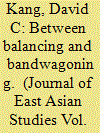

|
|
|
|
|
| Publication |
2009.
|
| Summary/Abstract |
Why has South Korea accommodated China, instead of fearing its growth and balancing against it? This article makes two central arguments. First, concepts of balancing and bandwagoning are fundamentally difficult to test, and to the extent that the theory can be tested, it appears to be wrong in the case of South Korea. In fact, we observe many cases in which rising powers are neither balanced nor "bandwagoned" but are simply accommodated with no fundamental change either way in military stance or alignment posture. Second, the factors that explain South Korean foreign policy orientation toward China are as much about interests as they are about material power. South Korea sees substantially more economic opportunity than military threat associated with China's rise; but even more importantly, South Korea evaluates China's goals as not directly threatening.
|
|
|
|
|
|
|
|
|
|
|
|
|
|
|
|
| 4 |
ID:
094851
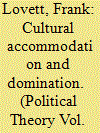

|
|
|
|
|
| Publication |
2010.
|
| Summary/Abstract |
When should burdened social practices be granted special accommodation? One issue of concern-raised by Okin and others-is that some social practices involve domination, and so the accommodation of those practices might (inadvertently, perhaps) support social injustice. Suppose one wants to take this concern very seriously. Starting from the assumption that freedom from domination is an especially important value, this article examines whether cultural accommodation would ever be advisable. Approaching the problem of multicultural accommodation from this point of view greatly clarifies the debate and yields some interesting results. In particular, the discussion concludes that there are circumstances under which the goal of minimizing domination itself would be furthered by policies of special accommodation.
|
|
|
|
|
|
|
|
|
|
|
|
|
|
|
|
| 5 |
ID:
119496
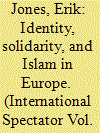

|
|
|
|
|
| Publication |
2013.
|
| Summary/Abstract |
Populists argue that Islamic immigrants are fundamentally different from Europeans. As evidence, they point to notions of religious and cultural identity. Such arguments have popular resonance. As more mainstream politicians pick up on these themes, they begin to take on an air of common sense. Nevertheless, they are mistaken. Europe has a long track record of reconciling competing identities. This has happened by focusing on patterns of interaction (solidarity) rather than obvious indicators of distinctiveness. Using the examples of the Netherlands and Turkey, this article illustrates the wide spectrum of European approaches to the challenge of getting different groups to share the same geographic space.
|
|
|
|
|
|
|
|
|
|
|
|
|
|
|
|
| 6 |
ID:
162429
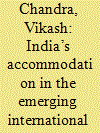

|
|
|
|
|
| Summary/Abstract |
This article has two-fold goals: to develop a coherent concept of accommodation and explicate variable shaping the process of accommodation; and to analyse and evaluate the challenges and prospects of India’s accommodation in the emerging international order. It defines accommodation as a ‘state strategy’ and ‘process’. It figures out six determinants viz. the sphere of influence, structural variables, convergence/divergence of national interest, perception and intention towards the international order, political and socio-cultural values, and costs of non- accommodation. Instead of addressing the process of accommodation from accommodation-seekers’ perspective, the article investigates the issue from accommodators’ perspective. Therefore, rather than describing traditional foundations of India’s claim of accommodation, i.e. population, territory, military, and democracy, it illustrates conditions under which the established power accommodate rising powers. By comparing and contrasting India’s interests, principles, and values vis-à-vis the USA and China, it demonstrates how differing strategic calculations, economic and commercial interests and divergence in political socio-cultural norms and values, China is posing or may pose challenges to India’s accommodation. It suggests that India needs to strike a balance between the declining America and rising China. It will have to learn how not to turn China from an adversary to an enemy. A prudent strategy for India will be to balance China, however, in the non-military, i.e. diplomatic, political and economic realms. Nevertheless, the engagement dimension should not be marginalised, actual or even perceived.
|
|
|
|
|
|
|
|
|
|
|
|
|
|
|
|
| 7 |
ID:
187046
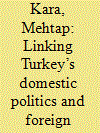

|
|
|
|
|
| Summary/Abstract |
This article examines Turkish domestic politics and the country’s foreign policy behaviors under the ruling Justice and Development Party (AKP), using Joe Hagan’s three alternative political strategies: accommodation, insulation, and mobilization. The first AKP administration used an accommodation strategy to avoid confrontations with military and judiciary institutions, resulting in restrained foreign policymaking. During its second tenure, the AKP leadership successfully insulated domestic opposition, allowing for implementation of a new foreign policy agenda. In the post-failed coup period, to discredit domestic adversaries, unify the public, legitimize leadership positions, and demonstrate a capacity for maintaining the nation’s security, the AKP has adopted a mobilization strategy and manipulated Turkish foreign policy through a ‘diversionary war’ in Syria and periodically escalated tensions in the Eastern Mediterranean region. This strategy has helped contain domestic opposition, while diverting public attention from divisive domestic problems to Turkish military activities abroad.
|
|
|
|
|
|
|
|
|
|
|
|
|
|
|
|
| 8 |
ID:
165941
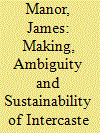

|
|
|
|
|
| Summary/Abstract |
In recent years, the increasing refusal by disadvantaged castes, especially Dalits (ex-untouchables), to accept caste hierarchies has increased intercaste tensions and violence in rural India. But intercaste accommodations aimed at avoiding violence have also increased, more sharply than violent incidents. This study explains how accommodations are made, almost always between senior Dalit and ‘higher’ caste leaders. Contrasts and parallels between their calculations and perspectives are examined, along with their views of the painful ambiguities that attend such accommodations. The authority of these senior leaders within their castes is, for the present, crucial to making accommodations sustainable. Changes that undermine their authority may make accommodations more difficult to forge and to sustain, but those changes may also provide a new basis for such agreements.
|
|
|
|
|
|
|
|
|
|
|
|
|
|
|
|
| 9 |
ID:
185508


|
|
|
|
|
| Summary/Abstract |
The ongoing security crisis in Mozambique reveals the limitations of the mainstream statist approach to security promotion. Whenever there is social conflict or unrest, state authorities instinctively and routinely rely on military means to deal with it. However, this approach disregards the root causes of the problem, which are often the internal social, political and economic triggers of insecurity. Presently there are international security actors assisting the Mozambican government in dealing with the armed conflict in their country. As a contribution to the emerging body of work on Mozambique’s security challenges beginning in 1990, this paper adopts a critical security perspective in the analysis of the problem. The view is taken that there ought to be a balanced or broader approach to security. Although a military response is necessary for combating hostile forces, this effort should go in tandem with addressing the fundamental causes of the crisis. The paper argues that in Mozambique poor governance in the form of corruption, political patronage, marginalisation of minority groups, centralisation of power and other exclusionary practices are the major sources of the country’s insecurity. Some proposals are suggested to address these challenges.
|
|
|
|
|
|
|
|
|
|
|
|
|
|
|
|
| 10 |
ID:
193044
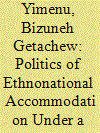

|
|
|
|
|
| Summary/Abstract |
Ethiopia is the most prominent example of the late 20th-century adoption of federalism to accommodate diversity and complete state-building. This article explores the implementation of federalism and accommodation of ethnonational diversity in dominant party regimes by using Ethiopia as a case. Drawing on legal documents, literature, news sources and government reports, the article argues that federalism enabled distinctive groups to promote their culture, use their languages and exercise self-rule in their territory. However, ethnonationalities’ constitutionally proclaimed self-determination rights and the practice rarely correspond. Although all ethnonationalities have the same constitutional rights, some are still subjugated, and self-rule remains their dream. The dominant party regime in Ethiopia met demands for self-rule and accommodation with suppression and violence. The constitution grants regions to use their legislative powers to accommodate region-specific demands; nevertheless, regions cannot operate out of the narrow framework of the federal ruling party. Thus, regions became repressive agents of the centre rather than genuine self-rule agents. Insights from Ethiopia have broader implications for states embracing federalism.
|
|
|
|
|
|
|
|
|
|
|
|
|
|
|
|
| 11 |
ID:
146928
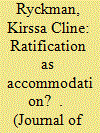

|
|
|
|
|
| Summary/Abstract |
Repression is the expected response to anti-government protest; however, leaders can also accommodate demonstrators. Committing to human rights treaties is considered in this environment, where treaty commitments are conceptualized as a policy concession that leaders can grant dissenters. Past research has shown that top-down domestic pressures, such as new democratic regimes, can influence treaty commitments. This article extends this line of research by considering the influence of bottom-up domestic pressure, arguing that nonviolent, pro-democracy movements can pressure leaders into concessions, as these movements are risky to repress but threatening to ignore. Leaders are expected to seek ‘cheap’ accommodations, and commitments to human rights treaties provide a relatively low-cost concession that also addresses demonstrators’ pro-democracy demands. Using commitments to the nine core UN human rights treaties, results are generally supportive. Governments experiencing a nonviolent, pro-democracy movement are consistently likely to sign human rights treaties. Ratification is also likely but in more limited contexts, and is more closely related to movement success. This suggests that bottom-up pressures can influence commitment to human rights treaties, but there may be little substance behind those concessions. The status quo and cost-averse preferences of leaders lead them to grant accommodations that result in minimal change and cost.
|
|
|
|
|
|
|
|
|
|
|
|
|
|
|
|
| 12 |
ID:
113944
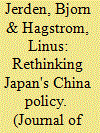

|
|
|
|
|
| Publication |
2012.
|
| Summary/Abstract |
For the last four decades Sino-Japanese relations have been characterized by steadily growing economic and sociocultural interactions. Yet, greater interdependence has developed in tandem with bilateral tensions. Many analysts have attempted to explain the latter as a result of Japan trying to balance or contain the burgeoning growth of Chinese capabilities. In this article, we question and qualify this widespread understanding of Japan's response to China's rise by examining how Japan has handled China's rise between 1978 and 2011. More precisely, how has Japan dealt with China's long-term core strategic interests, which are embodied in the post-1978 Chinese "grand strategy" that is believed to have been instrumental to China's rise? Our main finding is that to a significant degree Japan has accommodated the rise of China rather than balanced against it.
|
|
|
|
|
|
|
|
|
|
|
|
|
|
|
|
| 13 |
ID:
150989


|
|
|
|
|
| Summary/Abstract |
Once a set of civil war actors reach a final peace agreement, a number of different implementation sequences are possible as the negotiated provisions are put into practice. We focus on a key but threatening stepping stone in the post-accord period—the holding of the first post-accord election—which has the capacity to be a stabilizing or destabilizing force. We identify effective accommodation provisions that civil war actors can negotiate and implement before the first post-accord election to reduce the chances of renewed violence. Utilizing new longitudinal data on the implementation of comprehensive peace agreements between 1989 and 2012 and a series of survival models, we find that if the first post-accord election is preceded by the implementation of accommodation measures, elections can have a peace-promoting effect. However, in the absence of preelection accommodation measures, elections are much more likely to be followed by peace failure
|
|
|
|
|
|
|
|
|
|
|
|
|
|
|
|
| 14 |
ID:
165296


|
|
|
|
|
| Summary/Abstract |
This article seeks to determine the accuracy of predictions made by researchers of Israeli politics regarding the disappearance of the consociational model in state‒religion relations, to be replaced by the emergence of a crisis model, which threatens the stability of Israeli democracy. Using a unique methodological tool, based on the relative importance assigned to the issue in the platforms of the parties, we followed the positioning of the issue on the agenda over the years, and investigated whether it was becoming more prominent since the 1990s as an indication of the crumbling of the consociational model. The findings revealed, indeed, that in the late 1990s the tension around religion‒state relations reached its peak and was reflected in a higher rank order on the agenda. However, during the twenty-first century, the tension has not been rising, while the 2015 elections show a dramatic decline in the issue’s positioning on the agenda, which refutes the researchers’ forecast.
|
|
|
|
|
|
|
|
|
|
|
|
|
|
|
|
| 15 |
ID:
171808
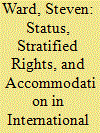

|
|
|
|
|
| Summary/Abstract |
Denied status claims can produce serious interstate conflict and accommodation may thus be an important means of avoiding conflict with rising and reemerging status seekers such as China and Russia. But accommodation is an underdeveloped concept. This article draws on scholarship about recognition and hierarchy to propose a novel means of understanding status accommodation: as behavior that sends signals to status seekers about the validity of claims to stratified rights. This framework implies that acts that signal status denial (and thus cause conflict over status) may be driven by three broad kinds of processes: anxiety about a state's position in the world; incompatibility between nonstatus interests and claims to status-implicated rights; and fears about the implications of status accommodation for the validity of discourses and ideas that produce both international and domestic order. These dynamics—especially the latter two—may be linked to domestic political mechanisms and concerns in ways that analysts do not fully appreciate. I illustrate the framework by examining the forces that drove the United States to deny Japanese claims to equal status during the decades before World War II.
|
|
|
|
|
|
|
|
|
|
|
|
|
|
|
|
| 16 |
ID:
094849
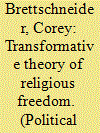

|
|
|
|
|
| Publication |
2010.
|
| Summary/Abstract |
Religious freedom is often thought to protect, not only religious practices, but also the underlying religious beliefs of citizens. But what should be said about religious beliefs that oppose religious freedom itself or that deny the concept of equal citizenship? The author argues here that such beliefs, while protected against coercive sanction, are rightly subject to attempts at transformation by the state in its expressive capacities. Transformation is entailed by a commitment to publicizing the reasons and principles that justify the basic rights of citizens.
|
|
|
|
|
|
|
|
|
|
|
|
|
|
|
|
| 17 |
ID:
190799


|
|
|
|
|
| Summary/Abstract |
This paper discusses how different groups within Myanmar’s population respond to multiple crises caused by the 2021 military coup, the economic and social consequences of multiple waves of Covid-19 and increasing global food and fuel prices. It is based on monthly observation reports (MOR) by local researchers to focus on the range of actions taken by Myanmar’s silent accommodating majority. Contrary to conventional studies that treat “loyalty” and “passive resistance” as separate categories of individual or collective responses to government failures, this paper introduces “accommodation” as a strategy to reflect actions by those who have engaged in both compliance and passive resistance to deal with the military dictatorship in Myanmar. Those who practice accommodation strategies prioritize safety-first approaches that avoid open resistance to the military regime while simultaneously challenging its claim to legitimacy. Some of the strategies that undermine the military regime’s claim to legitimacy, however, such as the civil disobedience movement in education and healthcare, further deprive the state of the resource to serve the needs of the general population and thus have detrimental and long-term impacts on individuals who use these.
|
|
|
|
|
|
|
|
|
|
|
|
|
|
|
|
| 18 |
ID:
154926


|
|
|
|
|
| Summary/Abstract |
We examine what leads states to accommodate enduring, international rivals in response to immediate threats. Drawing from network theory, we hypothesize that the direct and indirect ties the threatened state’s rivals form with each other and with other states in the global system play a critical role in shaping crisis. A threatened state should be more likely to accommodate rivals with economic connections to other actors. These connections generate influence, through leverage or information that can lead to crisis de-escalation. A threatened state is less likely to accommodate a rival that has military alliances with other rivals because credible allies are less likely to respond to such overtures. We use network analysis and data from the post–Cold War era to support the argument, shedding light on the importance of local and global connectivity in conflict management.
|
|
|
|
|
|
|
|
|
|
|
|
|
|
|
|
|
|
|
|
|